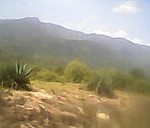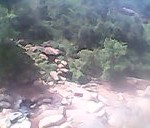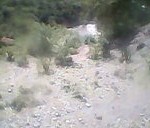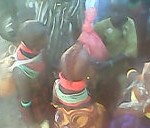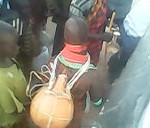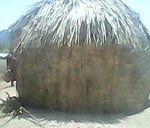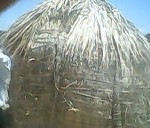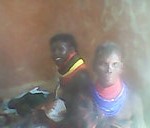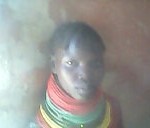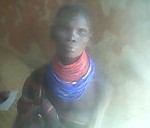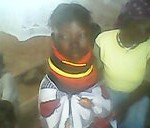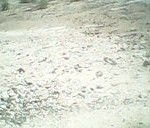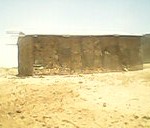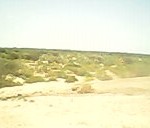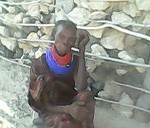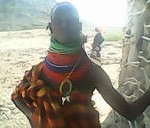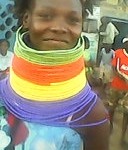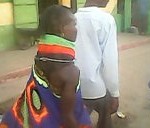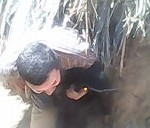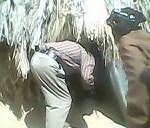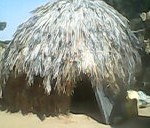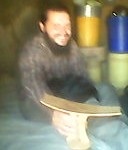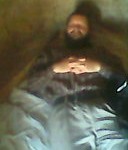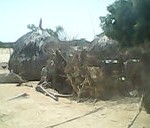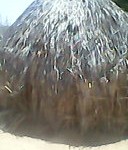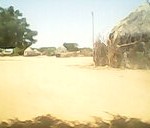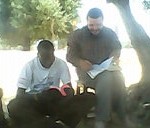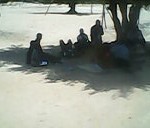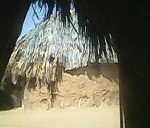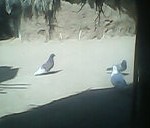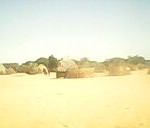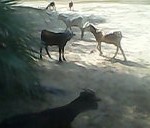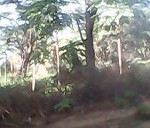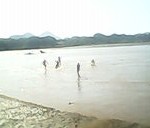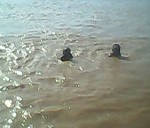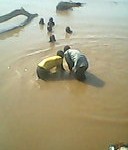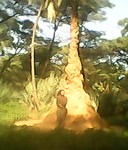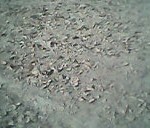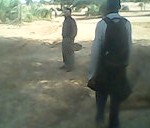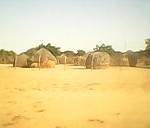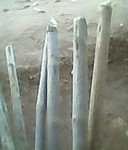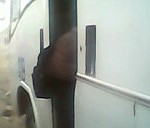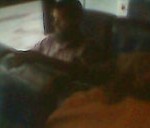Lodwar/Turkana Mission Report –Exhausted! But also encouraged. I just returned from a long overnight bus journey from Lodwar. Let me share the experience with you. Pictures will come later…they are on Sam’s phone.
It started with a mission in West Pokot last month. Attending that mission were many people from afar…including Lodwar. Lodwar is the last city before Sudan, besides Kakuma which is a refugee camp. Citizens of Lodwar do not consider themselves Kenyan. They say they are “going to Kenya” when they travel to Kitale. Turn the radio on and you hear stations from Sudan and Ethiopia, not Kenya. It is beyond the reach of government and police. It is ruled by whoever holds the gun. Police and military have tried to tame the area without success. Now police will not dare venture to the area. As a result, missionaries seldom venture there as well.
To get there one must travel a long road (sort of a road) through mountain passes with steep drops (no guardrails!), steep inclines and descents miles long forcing the driver to go in first gear to prevent burning the brakes, desert paths that meander through dried river beds (and some not dry)…it is mostly unpaved and very treacherous. Our overloaded and top-heavy bus nearly tipped numerous times and we were also stopped by a gang of AK-47 weilding youth. They stopped the bus, walked around a bit, and then waved us on by. The trip through the desert must be at night to prevent tire failure…though we still suffered two blowouts. But sleep in not an option on these “roads.” And my bout with malaria did not make the trip very pleasurable. There are also elephants (the team saw them while I was sleeping) and lions there. We are talking the wild frontier!
Then there is the people. There are four tribes in Kenya that are the most respected and feared for their history as warriors. There are the Maasai, Sabaot, Pokot, and Turkana. They are all pastoralists with herds of either cows or goats. They are all cattle russlers. They all believe that all the cattle on earth rightly belong to them and do not consider it wrong to steal cattle from other tribes. The Maasai are fierce warriers who kill lions by hand as a rite of passage to manhood. They have never been conquered and walk with pride to this day. However, their warrier kin-tribes have continued to advance in warrior tactics. The other three tribes discovered the gun and guerilla warfare. The government of Kenya landed a crushing blow to the Sabaot a few years back but to this day have not been able to subdue the Pokot or Turkana tribal areas.
The Turkana and Pokot are bitter enemies, exchanging cattle raids with seasonal regularity. The Pokot are further south and have cows. The Turkana live in drier regions and only have goats. However, when dry season comes, the goats die. When the weather breaks the Turkana again must go raiding the Pokot to replenish their goat supply. Also, guns are numerous but bullets are scarce. There are just two sources: attack a police outpost (which is common) and steal their bullets or trade the Sudanese bullets for a cow. One cow is worth 200 rounds. Now the Turkana do not have cows. So they must raid the Pokot for cows and trek them to Sudan to exchange for bullets. That is life here on the wild frontier.
Then there is culture. Straight from a National Geographic special! Perfectly acceptable for men, women and children to parade around with no clothes at all, right in town. Albeit somewhat rare in town (though I have seen several nude folks in town), but commonplace in the villages. They live in round reed and stick huts approximately eight to ten feet in diameter. These huts are excellent for offering cool shade even during afternoon heat. The land is public and communal, and not personally owned. People can move their homes at will in search of better food or water for their goats. Traditionally women wear numerous colorful beaded necklasses which stretch their necks and colorful wraps–but the poorest go nude and some of the progressive in town wear modern clothing. They may have some other jewelery. Traditionally men wear a colorful wrap. Men carry a stick used as a weapon, for walking and for herding goats. They also carry a unique wooden stool that serves as a shield, weapon, pillow, and chair. All of these tribes rest their head on a wooden stool for a pillow each night. They brush their teeth with a stick that when broken emulates toothbrush bristles. Bathing is public fare at the rivers.
Boys are trained as youth in archery. They can finish a person from hundreds of meters with precision with their powerful homemade bows. When they master the art, they graduate to guns. They are given ten rounds and must pierce the center of a coin from hundreds of yards with open sights by the tenth round or receive a severe communal caning. No schools or hospitals outside of town centers–and this is a vast area. They know how to trek in deserts. It took Charles one year on foot to make the trip to Lodwar (the big city) from his home town. That is resolve!
Lodwar is Turkana territory. We travel through Pokot territory (equally lawless) to get there, but it is 100% Turkana. I have been given great favor ministering to Turkana people. In fact, I have baptized more Turkana than any other tribe. This is interesting since I live in Bukusu lands and walk and work with mostly Luhyas. There is something about Turkanas that I love tremendously. They are hard people to change. However, when they hear truth; when they understand something; when they make a commitment; there is no turning them back. I love that. That is my personality. When I am serious about something I am very serious. But to change me is hard. They are a people of extremes. I am a person of extremes. When I served the world and sin, I served heartily. But when I converted and decided to follow Christ, I committed 100%.
So all these Turkana converts make strong disciples. They know how to count the cost and live and die for Jesus. Hard to find a Luhya or Kikuyu ready to live and die for Christ like that!
So these folks don’t grow crops. It is too dry. However, I am teaching them how now and they are excited to try some new techniques. They are eager to start soon and I will send someone to assist at first. Interestingly, water is not too deep. A borehole can be advanced for under $1000 by a local drilling machine. That one well can revolutionaize an area.
Their normal diet is goat and fish. Lake Turkana, a huge freshwater lake, boasts some excellent fishing. It is a vibrant industry for those fortunate to live close to the lake. But for most, it is the desert and goat. Lodwar is a boom town with all supplies coming from Kitale. All fruits and vegetables, beverages, and general wares come from Kitale. Without that lifeline the city would cease to exist. But the common folks in the rural places do not have access to those wares. When our bus drove to town it was cram packed with wares–even a new motorbike was put on the roof of the bus.
Turkanas are not considered unreached. The Joshua Project lists them as 48% reached. However, that 52% does not see much activity due to the extreme difficulty in accessibility via motor vehicle and lawlessness and risk of violence. The police and military are not even willing to venture to these parts let alone Kenyan and foreign missionaries. Another danger is the flood of refugees from neighboring Muslim countries Sudan, Somalia, and Ethiopia. With them comes elements of al-Shabaab which is the local al-Qaeda group. The lawlessness here gives them safe cover to organize.
There is another piece of trivia about Turkana. Gold and oil have been discovered here on public tribal lands. Anyone can go prospecting (that is, Turkanas) and many have become rich. Almost all the shops and businesses in Lodwar were launched with funds from gold discoveries. But those who can get metal detectors are booming and the locals are missing out. The purchase of a metal detector for one of our disciples is some really low hanging fruit!
Well on to my recent mission. Pastor John from West Pokot organized this meeting with a local evangelist who attended my meeting in West Pokot. Pastor John saw me baptize five Turkanas in West Pokot which is now a strong house church of committed disciples. He knows first hand the power and simple effectiveness of New Testament practice and the Gospel of the KIngdom.
The first day we met in a small building in the middle of nowhere. We had half a dozen ministry leaders and a couple dozen church members and local tribal folks. I taught the Gospel of the Kingdom and discipleship. Now I was shocked to find out that only two of my ministry leaders could read! When I learned that I suggested meeting at the guest house I was staying in for the second day to limit the meeting to ministry leaders. This was a bold step that I knew was necessary. I taught them house church planting and evangelism and how to teach the gospel and plant churches to illiterate people using storytelling and Shepherd’s Storybook. It was a great success! We now have an executable plan. Over night the Lord burdened me to teach them more. I saw a gap between presenting the Gospel of the Kingdom to a Christianized culture and presenting it to a totally unreached illiterate group. I taught them how to introduce God, the Bible, Jesus, Sin, Satan, and redemption. I praise God for this. It was awesome. The Lord showed me exactly how to present these concepts to people through a simple and remarkably convincing story presentation. The students were very appreciative for this additional instruction.
In order not to offend the people who had organized at the other location I sent Silas with Charles (who is fluent in 18 tribal languages including all of these warrior tribes and many unreached groups) to teach them. They gathered 52 people who were there for a funeral. The completely unexpected irony was the host of the funeral was Charles’ aunt and the person who died was his cousin! Small world! That village was already Christianized as one of my student pastors lived there. He said there were only two non-Christians in that village. Guess what! Those two repented–one a Muslim–and are being baptized today as I write this. But I have to admit I was right in relocating the meeting. We would have been limited to the surficial while I know I needed to go deep with the four super-committed ministry leaders who will be the sprear-tip of the forthcoming mission work among the primitive tribal areas.
The last day was evangelism. Again, it was a reached area. I shared with three traditionally dressed mamas and two others in modern clothes. The irony, the traditionally dressed women were already baptized believers but the others were not. We baptized Sarah, a 25 year old married women struggling with an unfaithful husband who lived in Nairobi. She will be discipled by one of our trained leaders who is a gifted healer. She is a remarkable woman. God revealed Himself to her directly as a child before Christians were there. She now has a reputation from afar as the go-to person when sick. She has the gift! When she prays they are healed–period! This woman, whom I call “mama evangelist” and another woman paid for our food while there. A shop owner paid for accommodations and had his restaurant cook the food. They sent me away with many gifts such as a reed broom, mat, the wooden chair/pillow/shield (which was a huge honor to receive) and two pigeons which immediately flew away on me.
Please pray with me for time, tactics, and resources to thoroughly reach these people. We are planning two upcoming trips: one for agricultural projects and one to teach new leaders at Lake Turkana. Pray for success for those whom we have mobilized. Pray for the right projects to meet the needs of these people: metal detector for gold prospecting, water wells, agriculture, and so on (???). Pray for funding for those projects. Pray for me to fully train Charles and leverage his remarkable language skills–he is a huge asset that I want to fully utilize.
Thanks and God bless you

